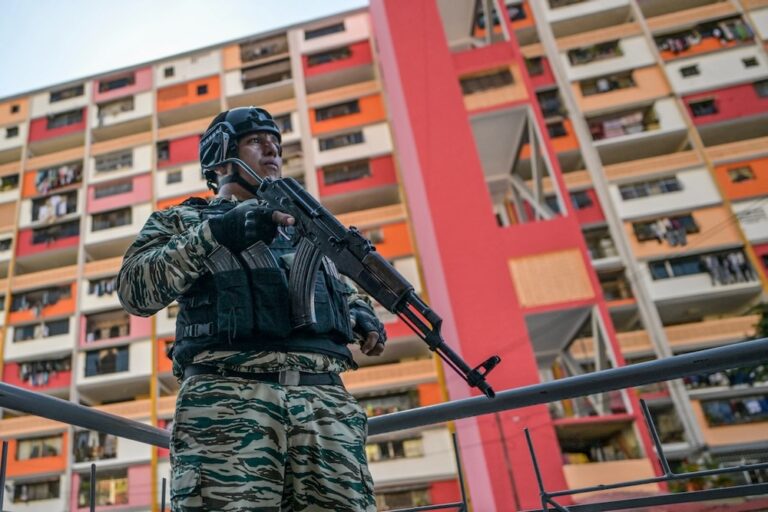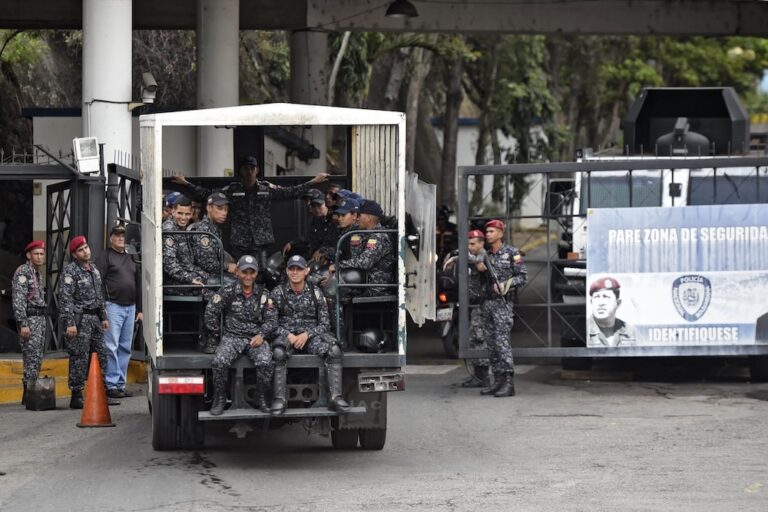(WAN/IFEX) – The following is a 7 May 2002 WAN press release: Caracas, Venezuela, 7 May 2002 For immediate release WAN, WEF Meet Venezuelan President Over Press Freedom Concerns Leaders of the World Association of Newspapers and World Editors Forum met the Venezuelan President, Hugo Chavez, in Caracas on Tuesday 7 May 2002 to denounce […]
(WAN/IFEX) – The following is a 7 May 2002 WAN press release:
Caracas, Venezuela, 7 May 2002
For immediate release
WAN, WEF Meet Venezuelan President Over Press Freedom Concerns
Leaders of the World Association of Newspapers and World Editors Forum met the Venezuelan President, Hugo Chavez, in Caracas on Tuesday 7 May 2002 to denounce violence against journalists and media and to ask him to stop violating press freedom in the country.
“The international community is seriously concerned with the press situation in Venezuela, particularly with a series of hostile acts against journalists and media that have been encouraged, either directly or indirectly, by the President and the government of Venezuela,” the WAN group told President Chavez.
The President responded: “The attacks on journalists and newspapers are of course something to regret, but they are nothing compared to the attacks on Venezuela from the main part of the media.”
The delegation from WAN and the WEF, the first international press freedom organisations to meet with President Chavez since a failed coup briefly removed him from power last month, asked him:
–to fully investigate all attacks on journalists and media and ensure that those responsible are brought to justice. The delegation was particularly concerned with the murder of photographer Jorge Tortoza, who was killed by a sniper who was shooting from a government building during an anti-Chavez demonstration on 11 April.
–to ensure that journalists and media are allowed to work in conditions that guarantee freedom and independence and ensure that police protect media professionals and intervene when they are attacked;
–to cease his inflammatory comments about the press that have encouraged mob attacks and other violence against journalists and media;
–to include press representatives in reconciliation dialogues;
–to fully respect article 143 of the Constitution, which guarantees press access to all information of public interest and to guarantee government transparency. President Chavez was also asked to guarantee that he and government officials will stop their de facto boycott of the press and participate in interviews and debates;
–to publish the text of a proposed new information law, which has been sent to the National Assembly, to avoid suspicions that its objective is to limit freedom of expression in Venezuela;
–to stop abusing the President’s right to have his speeches broadcast in their entirety on all television channels. Some of his television addresses have extended for more than five hours;
–to eliminate any financial or moral support to the violent “Circulos Bolivarianos” groups that have been attacking journalists and media organisations.
Members of the delegation said President Chavez reacted to the demands by trying to minimise the seriousness of the problems.
Before the meeting with President Chavez, the WAN delegation held discussions with journalists, publishers and other media executives about the increasing threats to the country’s press. These include frequent incidents of harassment, intimidation and threats — occurring both before and after the coup attempt — in an apparent government attempt to suppress critical journalism.
President Chavez has frequently spoken against journalists in inflammatory terms in political speeches and on radio and television but has spoken of reconciliation since the failed coup.
In March, WAN and the WEF protested against the attacks on the press and asked the President of the World Bank, James Wolfensohn, and the UN High Commissioner for Human Rights, Mary Robinson, to help pressure Mr Chavez to stop violating press freedom in his country.
Members of the WAN/WEF delegation were Roger Parkinson, the President of WAN, Pedro Ramirez, Editor-in-Chief of the Spanish daily El Mundo, Marcelo Rech, Editor of the Brazilian daily Zero Hora, and Mogens Schmidt, Assistant Director General of WAN and Director of the World Editors Forum.
The Paris-based WAN, the global organisation for the newspaper industry, defends and promotes press freedom world-wide. It represents 18,000 newspapers; its membership includes 71 national newspaper associations, individual newspaper executives in 100 countries, 13 news agencies and seven regional and world-wide press groups.
The WEF is the division of WAN that represents senior news executives.


